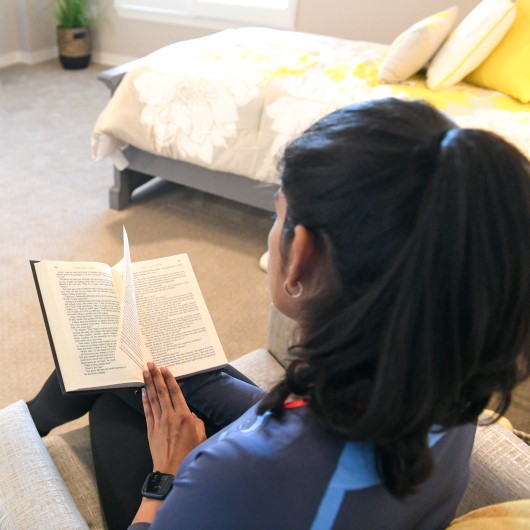Suffering from Obstructive Sleep Apnea? Here’s a CPAP Alternative

February 03, 2022
Roughly half of patients who need CPAP machines have shown they are not able or willing to use these devices for the long term despite the serious health risks they face from obstructive sleep apnea. Now there is an innovative, new treatment approved by the U.S. Food and Drug Administration (FDA) that may be an alternative to CPAP: the Inspire® Upper Airway Stimulation system.
The Inspire® system is an implantable device that frees patients from uncomfortable face masks, cumbersome plastic tubing and noise, as well as the stuffy nose, skin irritation and dry mouth that come with CPAP machine use. The device operates from within the patient’s body and works with their natural breathing process to alleviate apnea episodes.
“These patients require treatment because apnea restricts the oxygen flow to the brain, heart and other vital organs, putting them at substantial risk for heart damage, stroke, weight gain, high blood pressure, heart failure and even type 2 diabetes,” says Adrian Pristas, M.D., corporate medical director of Sleep Medicine at Hackensack Meridian Health. “For patients who have moderate to severe obstructive sleep apnea, the Inspire® device functions much like a pacemaker to keep their throat open so they breathe naturally and get healthful sleep.”
How It Works
The Inspire® device—a small impulse generator—is inserted during an outpatient procedure while the patient is under general anesthesia. A pocket is created surgically under the skin below the collarbone to hold the device.
Minor incisions are required to attach the two instruments that extend from the device:
- One is a sensor placed in the chest between the external and intercostal muscles to measure the patient’s breathing.
- The other is a stimulator attached to the branch of the hypoglossal nerve (that causes tongue protrusion) and delivers a mild electrical message to the nerve at the base of the tongue when the patient inhales to open the airway.
Following the surgery, there is a period of healing for about a month before the device is activated, during which time the CPAP will continue to be used. Then a sleep study will be done to ensure the device is working properly and to calibrate it to deliver the appropriate stimulation.
Once the Inspire® device has been activated at a sleep study, the patient controls it with a handheld device similar to a remote control. Like a CPAP, it is only used when the patient is planning to sleep. But instead of donning the cumbersome mask and rig, the patient presses a button on the remote control and holds it momentarily over the device implanted in their chest.
During the first year after implantation, patients normally see their doctor several times to confirm the device is working properly and there are no side effects. After that, most can move to annual check-ups.
A Whole New World
“Sleep apnea impacts millions of Americans, and this advanced therapy will help us treat more patients who struggle with CPAP,” Dr. Pristas says. “Studies have shown that Inspire® therapy can enhance a patient’s health by significantly reducing the frequency and adverse impact of their sleep apnea events.”
Next Steps & Resources:
- Meet our source: Adrian Pristas, M.D.
- To make an appointment with Dr. Pristas or a doctor near you, call 800-822-8905 or visit our website.
- Learn more about care for sleep disorders, including the Inspire therapy
The material provided through HealthU is intended to be used as general information only and should not replace the advice of your physician. Always consult your physician for individual care.
Can Wearables Help You Sleep Better?

Are you one of the millions of Americans who began wearing activity trackers like Fitbit, Apple Watch or Oura Ring in recent years?
Are Naps Good for You?

Ever feel like a quick power nap could solve all your problems? While naps can be beneficial for boosting mood and alertness, it's important to understand the science behind them. Learn how to nap strategically and when to seek professional help for sleep concerns.

Can Melatonin Help Kids Sleep?
When your child has trouble falling asleep, are kid-friendly melatonin gummies a safe option? Pediatrician sleep specialists weigh in.

Does Brain Training Work?
Regular exercise and training can boost power in our core. Can training our brains have similar results?

Can COVID Cause Insomnia?
Dubbed “coronasomnia,” sleepless nights can also be caused by a total disruption of daily routines, monotony in the day or complete lack of a daily routine.

How to Beat Brain Fog
Brain fog can be caused by lack of sleep, increased stress, certain foods in your diet or, in some cases, a medication or medical condition. Regardless of the source of brain fog, here's how you can help combat it.
